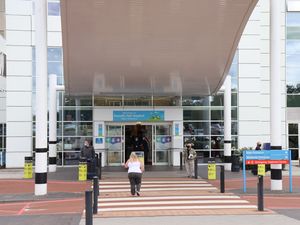Children's services at Dudley hospital have improved but emergency care 'requires improvement' - CQC
Services for children and young people have improved at a Black Country NHS trust but urgent and emergency care still ‘requires improvement’, a health watchdog announced today.

The Care Quality Commission (CQC) inspected urgent and emergency services as well as services for children and young people at Dudley's Russells Hall Hospital in May and June.
A new report outlining the findings of the inspection has been published today.
The overall rating for services for children and young people went up from 'requires improvement' to 'good', although for urgent and emergency services it remained 'requires improvement'.
When sharing feedback, the CQC said that staff treated children and young people with compassion and kindness, respecting their privacy and dignity.
Inspectors said the service planned care to meet the needs of local people and took account of the individual needs of children and young people in its care.
Furthermore, the leaders ran the service well, supporting their staff to develop their skills and it was clear staff had solid training in understanding how to protect children and young people, managing their safety well.
Whilst the rating for the trust’s urgent and emergency services remained the same at ‘requires improvement’, the CQC highlighted that positive improvements had been made, such as ensuring waiting times were monitored to ensure people could access emergency services when needed and receive treatment within agreed time-frames.
Chief executive at The Dudley Group NHS Foundation Trust, Diane Wake said: “We are really pleased that the CQC has rated our children and young people service as good.
“This achievement is down to the commitment and determination of staff to improve care for young people and children using the service and we are pleased that the inspectors highlighted widespread improvement in the quality of care provided.
“Whist our urgent care and emergency services rating remained the same, we are confident that the planned works being made to transform our resus facilities, which begin next year, and the work we are doing to improve our safeguarding training for staff will be the appropriate action needed to improve this rating in the future.
“It’s pleasing to see that both reports also acknowledge overall how our staff are focused on providing the best possible care and are proactive in addressing health inequalities.”
The trust announced in October that it has been successful in securing a £16.9m redevelopment bid to develop a new state-of-the-art facility that will provide an enhanced resuscitation space that will revolutionise the care given at its emergency department.
The build, beginning in spring next year, will also look to address improving ambulance offload times.
Charlotte Rudge, CQC deputy director of operations in the Midlands, said: “When we inspected The Dudley Group NHS Foundation Trust, it was positive to see improvements had been made across both services, and leaders must now ensure further improvements are made and the ones already made are sustained.
“We saw visible and approachable leaders in the children and young people’s services, and staff who were proud of their work and were kind and caring to the children and young people in their care.
“We sat in on a children’s outpatient appointment with a consultant and observed excellent interactions with the child and their family.
"The consultant listened carefully to any concerns and spoke to the child in a child-friendly way, avoiding any jargon and putting them at ease.
“In urgent and emergency care, we also saw hard-working, kind, and considerate staff who were committed to providing the best care to people using the service.
“Managers monitored waiting times and made sure people could access emergency services when needed and receive treatment within agreed time-frames.
“However, ambulance offload times regularly didn’t meet the trust target of 95 per cent of people being taken to A&E within 15 minutes.
"This had been consistently low at the start of the year which could have a detrimental impact on people’s care and increase the risk of deterioration in those in need of urgent care. Leaders must ensure this is improved as a priority to ensure nobody comes to harm.
“We will continue to monitor the trust, including through future inspections, to ensure further improvements are made so people can receive safe and appropriate care.”





